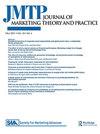Hedonism, hedonistic shopping experiences and compulsive buying tendency: a demographics-based model approach
IF 5.3
Q2 BUSINESS
引用次数: 8
Abstract
ABSTRACT Although consumer and marketing research has focused on identifying various precursors of compulsive buying behavior, little attention has been paid to more complex relationships examined from the perspective of hedonism as a personal value, hedonic shopping experiences, and consumer demographics. Thus, the present study postulates a mediation model in which the extent of hedonisms relationship to compulsive buying via hedonistic shopping experiences is diagnosed, and proceeds to moderation effects based on consumer demographic characteristics (i.e gender, age, education). Using data (N = 1,245) from a representative survey, and based on structural equation modeling, results revealed that hedonism significantly influences compulsive buying via hedonistic shopping experiences, while moderation effects indicated that these relationships were stronger in younger individuals, mostly women. In contrast, these effects were nonsignificant with regard to consumers’ education level. The studys findings are discussed in terms of the theoretical and practical insights to better understand and prevent contemporary consumerism trends related to hedonism, hedonistic shopping, and compulsive buying tendencies. The research also offers important public policy and retailing implications.享乐主义、享乐主义购物体验和强迫性购买倾向:基于人口统计学的模型方法
摘要尽管消费者和市场营销研究的重点是识别强迫性购买行为的各种前兆,但很少关注从个人价值、享乐购物体验和消费者人口统计的角度来研究更复杂的关系。因此,本研究假设了一个中介模型,在该模型中,通过享乐主义购物体验诊断享乐主义与强迫性购买的关系程度,并基于消费者人口统计学特征(即性别、年龄、教育程度)得出调节效应。使用一项具有代表性的调查的数据(N=1245),并基于结构方程模型,结果显示,享乐主义通过享乐主义购物体验显著影响强迫性购买,而适度效应表明,这些关系在年轻人中更强,主要是女性。相反,这些影响在消费者的教育水平方面并不显著。研究结果从理论和实践的角度进行了讨论,以更好地理解和预防与享乐主义、享乐主义购物和强迫性购买倾向相关的当代消费主义趋势。该研究还提供了重要的公共政策和零售启示。
本文章由计算机程序翻译,如有差异,请以英文原文为准。
求助全文
约1分钟内获得全文
求助全文
来源期刊

Journal of Marketing Theory and Practice
BUSINESS-
CiteScore
6.80
自引率
6.70%
发文量
37
期刊介绍:
The Journal of Marketing Theory & Practice is devoted to the publication of peer-reviewed articles addressing substantive, managerial issues in marketing. In the context of developing, enhancing, and disseminating marketing knowledge, JMTP publishes both conceptual and empirical work, so long as the work provides strong implications for the managerial practice of marketing. Unlike other marketing journals that may be more focused on specific methodological approaches, deal with theoretical issues without regard to application, or represent various subfields of marketing, JMTP is positioned as a general marketing journal affording a quality outlet for more managerially-oriented research across the scope of the field.
 求助内容:
求助内容: 应助结果提醒方式:
应助结果提醒方式:


